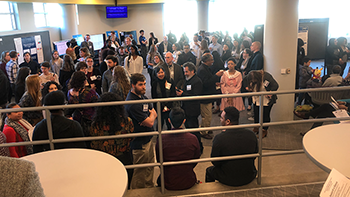Validity and Reliability of Eye-Tracking as a Measure of Impasse Problem Solving
Description/Abstract/Artist Statement
Creativity in human cognition will be the focus of the current study. More specifically, the theory of insight problem solving will be investigated. Insight includes a moment of high amounts of suddenness, high amounts of confidence, and low amounts of effort involved in finding the solution. In the process of insight problem solving, a person will most likely reach a period known as impasse, the subjective feeling of not knowing what to do or simply being stuck. This study aims to identify the validity and reliability of eye tracking as a measure of insight by comparing the method against Think Aloud Protocol and Aha! Ratings, which is a self-reported measure. The study predicts eye tracking will be more reliable compared to the current methods of Think Aloud and Aha! Ratings since it can decrease bias in interrater reliability and will have predictably less interference in reliability since it does not require the participant to have a full understanding of the concept and rate themselves subjectively.
Faculty Advisor/Mentor
Ivan Ash
Presentation Type
Poster
Disciplines
Cognition and Perception | Cognitive Psychology
Session Title
Poster Session
Location
Learning Commons, Atrium
Start Date
2-8-2020 8:00 AM
End Date
2-8-2020 12:30 PM
Validity and Reliability of Eye-Tracking as a Measure of Impasse Problem Solving
Learning Commons, Atrium
Creativity in human cognition will be the focus of the current study. More specifically, the theory of insight problem solving will be investigated. Insight includes a moment of high amounts of suddenness, high amounts of confidence, and low amounts of effort involved in finding the solution. In the process of insight problem solving, a person will most likely reach a period known as impasse, the subjective feeling of not knowing what to do or simply being stuck. This study aims to identify the validity and reliability of eye tracking as a measure of insight by comparing the method against Think Aloud Protocol and Aha! Ratings, which is a self-reported measure. The study predicts eye tracking will be more reliable compared to the current methods of Think Aloud and Aha! Ratings since it can decrease bias in interrater reliability and will have predictably less interference in reliability since it does not require the participant to have a full understanding of the concept and rate themselves subjectively.


